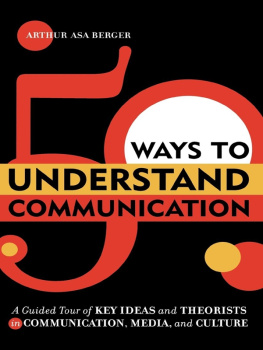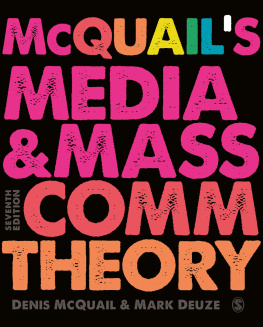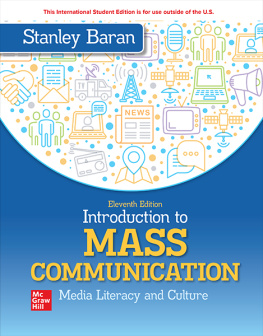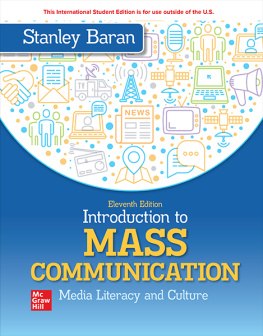First published 1980 by Transaction Publishers
Published 2017 by Routledge
2 Park Square, Milton Park, Abingdon, Oxon OX14 4RN
711 Third Avenue, New York, NY 10017, USA
Routledge is an imprint of the Taylor & Francis Group, an informa business
Copyright 1980 by Taylor & Francis.
All rights reserved. No part of this book may be reprinted or reproduced or utilised in any form or by any electronic, mechanical, or other means, now known or hereafter invented, including photocopying and recording, or in any information storage or retrieval system, without permission in writing from the publishers.
Notice:
Product or corporate names may be trademarks or registered trademarks, and are used only for identification and explanation without intent to infringe
Library of Congress Catalog Number: 78-55942
Library of Congress Cataloging-in-Publication Data
Berger, Arthur Asa, 1933
Television as an instrument of terror.
1. Mass mediaAddresses, essays, lecture. 2. Popular culture
Addresses, essays, lectures. I. Title.
P91.B45 301.16'1
78-55942
ISBN 0-878855-708-3
ISBN 13: 978-0-87855-708-0 (pbk)
It is, or should be, common knowledge in academia that Arthur Asa Berger is not for real. Indeed, the true identity of this red-haired elfin imposter, who is to popular culture what Frankenstein is to plastic surgery, may never truly be known. But though his range of interests is far too varied and eclectic for one mere mortal, he has been incredibly successful in protecting his anonymity while flaunting his perceptions within the pages of a steady stream of volumes, with which he has been subtly proselytizing generations of unsuspecting readers.
No delicate nuance in our culture seems to escape the eagle eye or scratchy pen-point of this sardonic spectator in the arena of life. Whether dealing with such earth-shattering subjects as "Dagwood in the American Psyche" or "Huck Finn as an Existential Hero," Berger strikes again and again with his pithy pronouncements and offbeat observations. Long have I known this titan of the trivial, this capricious chronicler of the trends and mores of our time; and long have I marvelled at his perception and his wit.
Now, for the first time, Berger the burgeoning Boswell of pop culture presents a cataclysmic collection of his essays, some of which have appeared in the Journal of Popular Culture, the Journal of Communication, Human Behavior, Rolling Stone, Society, the San Francisco Chronicle , and others of their ilk. Here, within these pages, you'll be assaulted by a vast cornucopia of daring concepts, dazzling critiques, and dramatic conclusions. Like 'em or lump 'em you won't be bored!
STAN LEE
(Publisher, Marvel Comics)
It is very satisfying for me to present this volume of collected essays some previously published and others appearing here for the first time. I am grateful to Irving Louis Horowitz and his cooperative colleagues at Transaction Books for their assistance with the book. And I am grateful to the editors of such journals as Rolling Stone, the Journal of Communication, the Journal of Popular Culture and Focus for publishing my work in the first place. I also appreciate, to a certain degree, the "Introduction, Of Sorts" which my good friend Stan Lee wrote for this book. At least I think I do? And I think that Stan Lee is a good friend? You have read his introduction and can decide for yourself.
How I ended up writing about popular culture and the mass media is, as they say, "a puzzlement." I spent my undergraduate years reading Victorian literature endlessly, it seems. I was a literature student and my work in criticism may have given me a point of view which I've applied to comics and television, amongst other things. But I was also a philosophy student and dabbler in the social sciences as well as an artist. When I went to graduate school in American Studies at the University of Minnesota, I moved into political theory, with Mulford Q. Sibley, and intellectual history, with David Noble. I wrote a term paper on Li'l Abner for Sibley in a political theory course and, once started on the subject, I continued on to do my doctorate on Li'l Abner... and to explore the vast and endlessly growing subject called popular culture, mass culture, the public arts and now, most recently, mass-mediated culture.
I have benefited from the ideas (and in some cases the friendship) of the following people and would like to acknowledge my indebtedness: Sigmund Freud, Bronislaw Malinowski, Mary Douglas, Jean-Marie Benoist, Umberto Eco, Marshall McLuhan, Leslie Fiedler, Alan Gowans, David Manning White, John Cawelti, Roland Barthes, Edgar Morin, Michael Real, George Gerbner, Aaron Wildavsky, Harry Geduld, Martin Grotjahn, S.I. Hayakawa, Ernest Dichter, Claude LviStrauss, Michel Foucault, Vladimir Propp, Gregory Bateson, Ferdinand de Saussure, Stanley Milgram, Johan Huizinga, Richard Hoggart, Herbert Hendin, Ernest Dichter, Herb Zettl, Stuart Hyde, and Charles "Sparky" Schulz. There are many others too.
The Faculty Manuscript Service at San Francisco State University typed the manuscript for this book with their typical zeal for perfection.
Grateful acknowledgement is made to the following publishers for permission to use copyrighted material:
"Some Thoughts on Threads," published by permission of California Living Magazine, the San Francisco Examiner.
"Politics in the Comics," published by permission of Crimmer's: The Journal of Narrative Arts, Spring 1976.
"The Last Word," published by permission of Focus Magazine, KQED Television, San Francisco, Ca.
"Discovering Pop Culture," "Dagwood in the American Psyche," and "English-American Crosscurrents," published by permission of Human Behavior magazine.
"Am I a Siamese Twin," "Analyzing the Advertisement," "Varieties of Topless Experience," published by permission of the Bowling Green State University Popular Press, The Journal of Popular Culture and Popular Culture Methods.
"Huck Finn as an Existential Hero," published by permission of Cyril Clemens, editor, Mark Twain Journal.
"Hamburger Heaven," published by permission of New Society. This article first appeared in New Society London, the weekly review of the Social Sciences.
"Yanqui Bread: The Great White Way," from Rolling Stone 1974 by Rolling Stone Magazine. All Rights Reserved. Reprinted by Permission.
"London's Underground as a Work of Art," "Pub Life," published in This World magazine, the San Francisco Chronicle.
"The Great Game of Academic," published in the Subterranean Sociology Newsletter.
"Upstairs, Downstairs," "The Six Million Dollar Man," published in Society, Transaction, Inc.
Myth and Modern Man by R. Patai, Prentice-Hall.
Sociology by Horton and Hunt and The Female Eunuch by Germaine Greer, McGraw-Hill Books.
Culture Against Man by J. Henry, Random House.
The Responsive Chord by A. Schwartz, Doubleday & Co.












